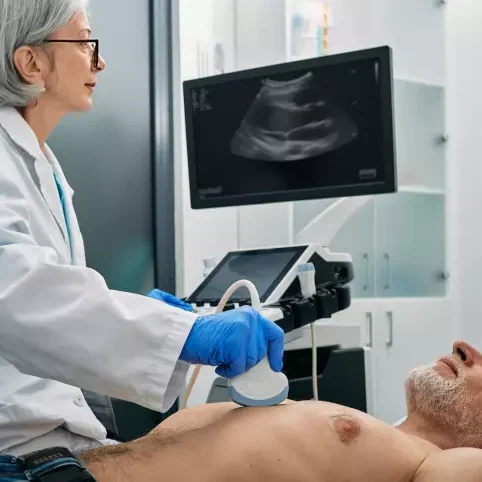AORTIC ANEURYSM TREATMENT IN LONDON
Aortic Aneurysm Treatment
The treatment options available for aortic aneurysms will depend on which choice is right for you. The treatments offered will either be non-surgical health management or surgical procedures.
Aortic aneurysms occur in your heart’s aorta. Over time, they can swell and possibly rupture.
At Expert Cardiologist, we can help you protect your heart health, including treating aortic aneurysms to prevent rupturing. Contact our caring team if you are concerned about your heart health and want to avoid an aortic aneurysm.
What Is An Aortic Aneurysm?
An aortic aneurysm is a heart condition that involves the weakening and ballooning of your aorta — the main artery in your body. The aorta carries oxygen-rich blood from the heart to the rest of your body.
The aorta can weaken over time, causing it to expand or bulge like a balloon. This expansion can occur for several reasons, and if left untreated, the weakened area will continue growing. As a result, it’s at an increased risk of rupturing, leading to life-threatening complications.
Aortic aneurysms could be a medical emergency, so diagnosing and monitoring them is crucial to prevent complications. Early diagnosis, regular heart check-ups, safeguarding your cardiovascular health and treatment can prevent a rupture from happening.

Types Of Aortic Aneurysm
There are two types of aortic aneurysms — abdominal and thoracic.
Symptoms Of Aortic Aneurysm
The symptoms of an aortic aneurysm will depend on its size, location and whether it is causing any complications in your body. Some cases of aortic aneurysm may be completely asymptomatic until the rupture occurs. That’s why regular heart check-ups, like our Healthy Heart Check, are essential for diagnosing and treating aortic aneurysms early.
However, you might experience some symptoms of an aortic aneurysm, including the following:
- Throbbing in your abdomen (only apparent in abdominal aortic aneurysms)
- Deep, constant pain in your chest, abdomen, back or groin
- Tenderness or sensitivity in the aneurysm’s area, worsening during physical exertion or applied pressured
When a rupture occurs, it is a medical emergency. If you feel sudden, severe pain in your chest, back or abdomen, call 999 immediately.
An absence of symptoms does not mean your heart health is fine. The only way to be sure you do not have an aortic aneurysm is through regular heart health screenings and monitoring.
What Causes Aortic Aneurysm?
Genetic and lifestyle factors play significant roles in the many potential causes of an aortic aneurysm. Understanding the factors that can cause an aortic aneurysm is crucial when preventing and managing the condition.
Chronic health conditions like hypertension (high blood pressure) can contribute to aortic aneurysm development. The excessive stress on your arterial walls causes them to weaken over time. The constant pressure and strain make the aorta more susceptible to aneurysm formation, especially in your abdominal aorta.

Aortic Aneurysm Risk Factors
Some risk factors can increase your likelihood of developing aortic aneurysms.
These risk factors include:
- Your age – as you age, the risk of aortic aneurysm increases
- Smoking – the habit causes your blood vessels to weaken and increases the likelihood of plaque build-up
- Family history – you may have a genetic predisposition to aortic aneurysm
- Gender – men can have a higher risk of aortic aneurysm than women
- Connective tissue disorders, such as Ehlers-Danlos syndrome – these cause a weakened aortic wall, making it more prone to aneurysm formation
You can avoid some of these risk factors. Smoking is a good example. However, you can’t prevent others like connective tissue disorders or age.
Worried about your heart?
DON’T suffer in silence, seek expert help without delay
How Is Aortic Aneurysm Diagnosed?
Diagnosing aortic aneurysm is vital for treatment and management. It involves a combination of physical examinations, advanced image testing and an assessment of your medical history.
Imaging is crucial for their detection, given that aortic aneurysms tend to be asymptomatic or initially have subtle symptoms.
Some of the tests performed to diagnose the condition include:
- Ultrasound
- Computed tomography (CT) scans
- Magnetic resonance imaging (MRI) scans
- Angiography
Once a doctor has diagnosed an aortic aneurysm, you must have regular monitoring and recommended treatments to maintain your heart health.
As aortic aneurysms generally have no symptoms, regular health check-ups help to ensure early detection. By diagnosing an aortic aneurysm early, we can start treatment sooner and reduce the risk of rupture.

Book A Cardiology Appointment With Dr Karagiannis
To improve your heart health, schedule an appointment with Dr Karagiannis for an aortic aneurysm evaluation. We offer specialised care and personalised treatment plans to help you protect your cardiovascular health.
Early detection and intervention can be life-saving, so contact us today and embark on the path to good heart health with the full support and expert knowledge of Dr Karagiannis.
GET IN TOUCH
Request A Call Back
Please fill in the contact form and we will call you back at a time most convenient for you.



